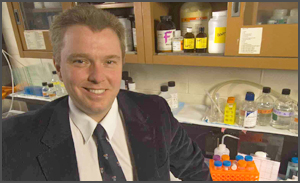May 26, 2016

Researchers at VCU Massey Cancer Center are conducting two clinical trials testing novel combination therapies for the treatment of brain and central nervous system cancers. The phase 1 and phase 2 clinical trials are both based on translational research performed at Massey by Paul Dent, Ph.D., Universal Corporation Chair in Cancer Cell Signaling and member of the Cancer Cell Signaling research program at VCU Massey as well as professor of biochemistry and molecular biology at VCU School of Medicine.
The phase 1 clinical trial is testing a novel combination therapy for newly diagnosed glioblastoma multiforme (GBM) patients. GBM is the most common and most lethal form of brain cancer, and the study will seek to determine the side effects and best dosage of a drug known as dimethyl fumarate (DMF) in combination with the standard approach to treating GBM, which involves the chemotherapy temozolomide and radiation therapy.
In preclinical experiments, Dent demonstrated that DMF, which is typically used to treat multiple sclerosis, may enhance the effectiveness of temozolomide and radiation therapy in killing brain cancer cells.
“This is the first time that this combination therapy has been used to treat GBM patients, so our goal is to ensure that it can safely be administered, determine the best dosage range and identify any side effects that may occur,” says the trial’s principal investigator Danielle Shafer, D.O., who is also the medical director of Massey’s Clinical Trials Office, hematologist-oncologist and member of the Developmental Therapeutics research program at Massey as well as an assistant professor in the Division of Hematology, Oncology and Palliative Care at the VCU School of Medicine. “Also, we are hoping to see a response in patients similar to the preclinical findings.”
The study opened in February and has nearly met its enrollment goal of approximately 12 patients. Between three to six weeks after surgery, patients begin therapy with temozolomide and DMF. Participants also undergo radiation therapy five days a week for six weeks. If their disease does not progress and side effects are found to be acceptable, patients continue with maintenance therapy of DMF and temozolomide.
The phase 2 clinical trial investigates how effectively a combination of the drugs sorafenib, valproic acid and sildenafil work in treating patients with recurrent high-grade glioma, a type of tumor that starts in the brain or spinal cord. These medications may be able to control and stop the growth of tumors cells by blocking some of the proteins needed to sustain cancer cell growth.
Sorafenib is a form of targeted therapy that interferes with the growth and spread of cancer cells in the body, and is most commonly used to treat liver, thyroid and kidney cancers. Valproic acid is used to treat seizure disorders and is in a family of drugs known as histone deacetylase inhibitors, which have known anticancer effects. Sildenafil possesses several mechanisms of action, one of which is to facilitate the accumulation of chemotherapy within cancer cells. Preclinical research by Dent showed that valproic acid may increase the effectiveness of sorafenib in killing cancer cells, while sildenafil may prevent sorafenib and valproic acid from escaping the glioma cells.
“I am very passionate about neurological cancer research because my father passed away from brain cancer," says Dent. "Our preclinical experiments showed promising results with these therapies, so we are excited to translate our discovery from the lab to the patient bedside. Especially since currently there are no curative therapies for high-grade gliomas, we are hopeful that this research will result in a new, effective therapy that can better manage the disease.”
The study began enrolling participants in July 2014 and is expected to end in December 2018. The trial seeks to enroll 44 participants ages 18 and over with grade 3 or 4 glioma. During this study, patients will be monitored for side effects and possible risk factors associated with this novel combination as well as response to therapy.
For more information about either of these studies, please contact the VCU Massey Cancer Center Solid Tumor Investigator-Initiated Trials team by phone at (804) 628-9238 or by email at masseysiit@vcu.edu. Reference clinical trial MCC-13-09950 for the phase 1 GBM trial and MCC-14816 for the phase 2 glioma study.
Written by: Massey Communications Office
Center News & Funding, Community Engagement & Health Equity, Massey 50
Massey Carnival celebrates community, NCI Comprehensive designationMay 15, 2024
Research, Center News & Funding
Kaustubh Datta studies prostate cancer disparities to make a difference in people’s livesMay 13, 2024
Center News & Funding, Massey 50, Clinical
Celebrating 50 years of Massey: From nurse practitioner to patientMay 06, 2024

Treatments in clinical trials may be more effective or have fewer side effects than the treatments that are currently available. With more than 200 studies for multiple types of cancers and cancer prevention, Massey supports a wide array of clinical trials.

Massey supports hundreds of top cancer specialists serving the needs of our patients. Massey’s medical team provides a wealth of expertise in cancer diagnosis, treatment, prevention and symptom management.